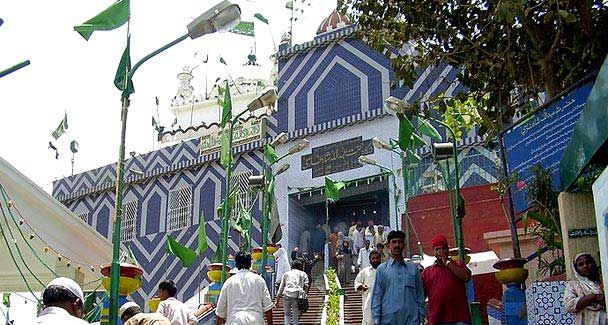“You [Muslims] are the best nation brought out for Mankind, commanding what is righteous and forbidding what is wrong "[3:110].In the context of Islam, the word ummah is used to mean the diaspora or "Community of the Believers" (ummat al-mu'minin), and thus the whole Muslim world.

The Shrine of Hazrat Abdullah Shah Ghazi, patron saint of Karachi
KARACHI, Pakistan — The streets of Pakistan's largest city were mostly quiet Friday as police stepped up patrols to prevent more violence after twin suicide attacks at a Sufi shrine sparked angry mobs to rampage through the southern Pakistani city.
Pakistan is 95 percent Muslim, and the majority practice Sufi-influenced Islam, whose more mystical practices are rejected by the Taliban and allied Islamic extremists — making Sufi sites a frequent target of militants.
Eight people were killed and 65 injured in the bombings Thursday evening at the most beloved Sufi shrine in Karachi.
The Taliban has claimed responsibility for the suicide bombing.
At least two buses were torched by mobs who also fired weapons into the air into the night. A bus also was set on fire Friday on a major road.
A suicide attack in July killed 47 people at the nation's most revered Sufi shrine, Data Darbar in the eastern city of Lahore. That attack infuriated many Pakistanis, who saw it as an unjustified assault on peaceful civilians. Read here for more
The Shrine of Hazrat Abdullah Shah Ghazi
The shrine of Syed Abdullah Shah Ghazi (RA) – an eighth-century Sufi-saint known as the saviour and defender of Karachi – on a hillock near the coast is believed by many to have protected the metropolis from cyclones.
Despite forecasts and warnings by weather experts several times in the past that a cyclone in the Arabian Sea was moving towards Karachi and could hit the city any moment, Ghazi’s devotees say that it is because of the presence of the saint that cyclones either bypassed the city and moved towards Gujarat in India or its velocity reduced to naught without causing any damage to the city.
The shrine has remained a centre of attraction for people belonging to different religions, sects, ethnicities and sections of society.
Not only religious people but also many politicians, including the slain prime minister Benazir Bhutto, have visited the shrine at least once in their lifetime to pay homage to the saint and seek spiritual guidance.
Born in 109 Hijra, Abdullah Shah Ghazi, according to devotees, was a grandson of Hazrat Imam Hassan (AS).
He migrated to Karachi in 138 Hijra during the Umayyad dynasty. Considering him a threat to their dynasty, the rulers hunted and martyred him with his many followers in 151 Hijra.
His followers chose the hillock for his burial.
At that time, the hillock was surrounded by the sea and potable water was not available. Devotees believe that it was his miracle that a fountain of drinking water emerged from the bottom of the hill that continues to flow to this day.
Karachi — which has turned into a metropolitan city of 18 million people from a tiny village of fishermen — has in its fold resting places of some 200 saints besides that of Abdullah Shah Ghazi.
According to an ex-administrator of the Auqaf department, some of the shrines located on vintage points in different parts of the city are:
- Syed Misri Shah in Clifton,
- Syed Ghalib Shah alias Qutbe Alam in Keamari,
- Syed Alam Shah Bokhari at Jamia Cloth Market, where three more saints (Baba Qatil Shah, Abdul Rehman Shaheed and Baba Ismail Shah Ghazi) had also their shrines,
- Mustan Shah Baba on MA Jinnah Road,
- Noorul Hasan alias Noori Baba in Teen Hatti,
- Syed Chuttan Shah Bokhari in Kharadar, Syed Jumman Shah near zoological gardens,
- Syed Wilayat Ali Shah on RCD Highway,
- Syed Qasim Ali Shah near Parco on Hub River Road,
- Syed Omar Shah Bokhari near Kalapul,
- Baba Kunda Shah Baloch near Korangi-4,
- Noorani Baba near Korangi-1,
- Baba Wilayat Shah in Jamia Millia, Malir,
- Doolah Shah Sabzwari in Kharadar,
- Mehmood Shah in F.B Area, Mir Azizullah Haqqani in Landhi,
- Syed Mehtab Shah in Soldier Bazaar, and
- Meera Bibi in Lea Market.
No comments:
Post a Comment